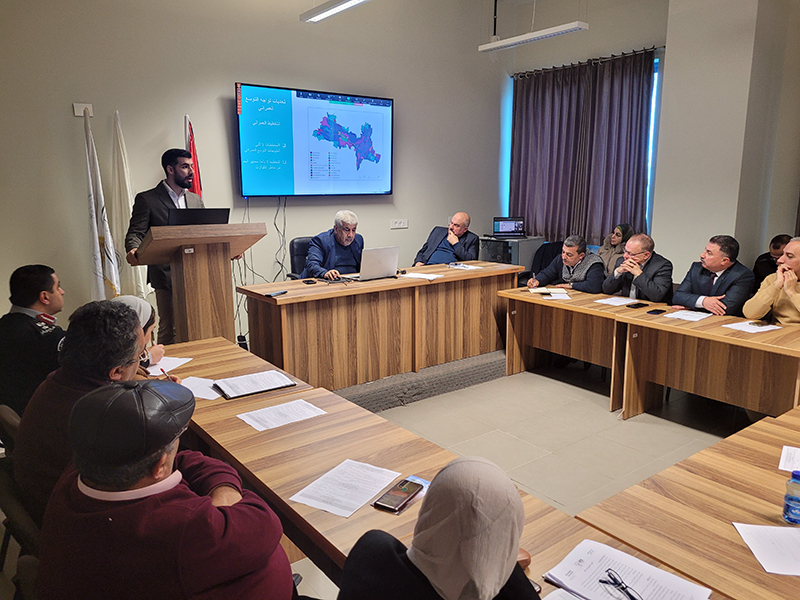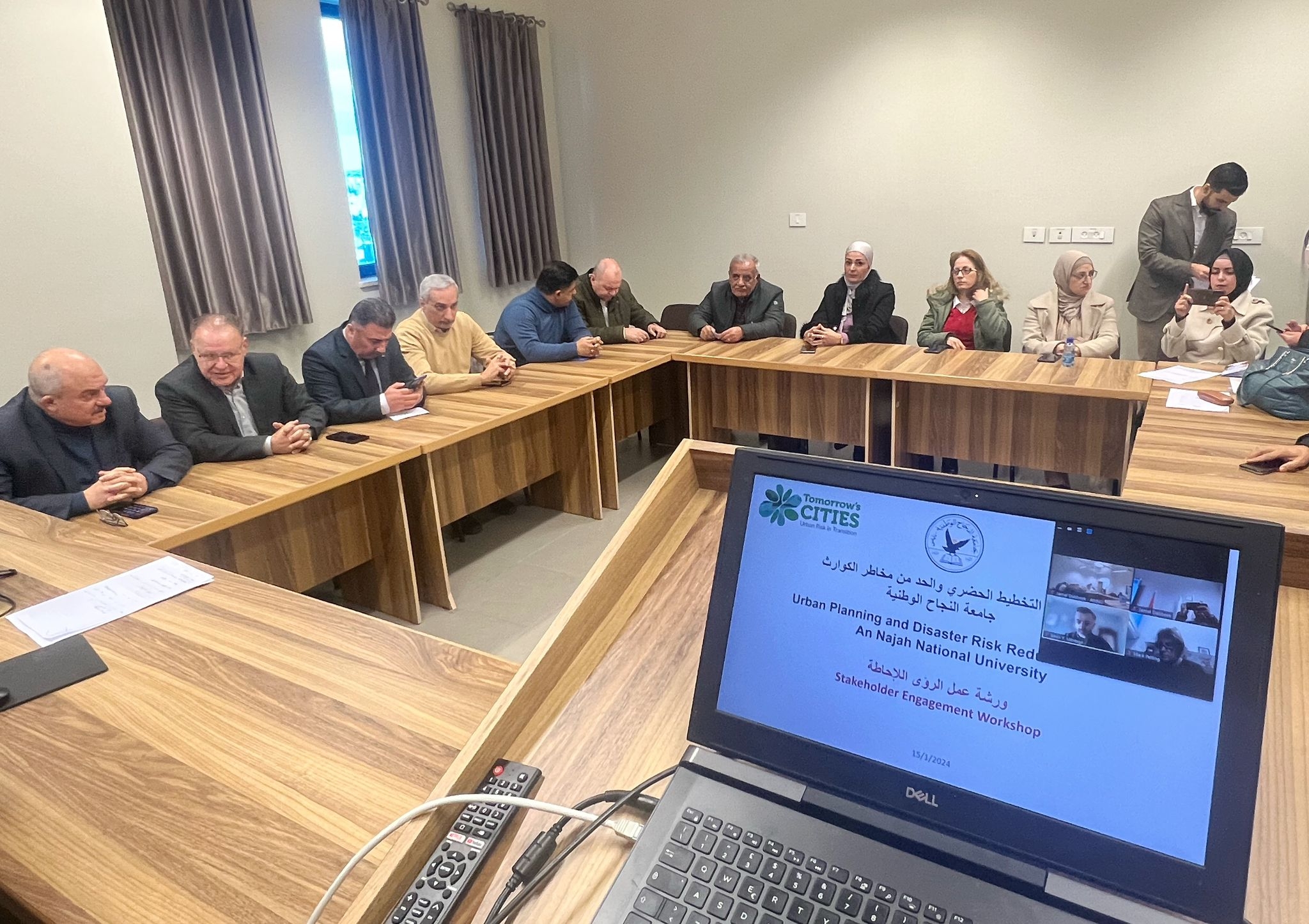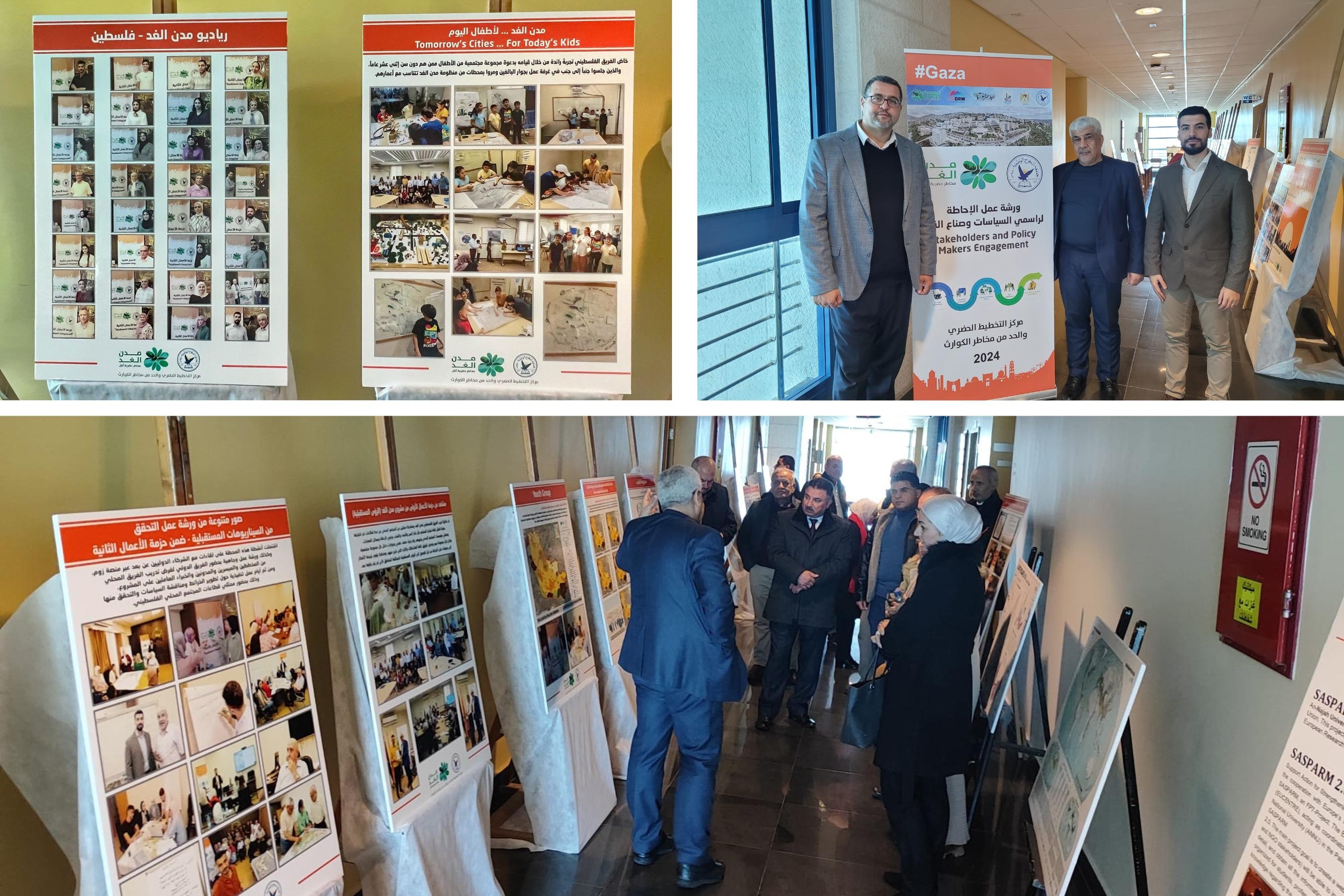
The Urban Planning and Disaster Risk Reduction Center at An-Najah National University recently organized an insightful engagement event aimed at enlightening decision-makers and policy influencers in Nablus about the pivotal outcomes of the Tomorrow's Cities deployment in the city. This event also served to communicate the vision different social groups have for the city's future captured during the project's activities through maps, data, and policies. Alongside the workshop, a three-day exhibition of photos and maps was held, showcasing the project's progress from its inception to its latest phases.
The event provided an opportunity to observe the reactions of decision-makers and policy drafters, in addition to collecting their feedback on implementation mechanisms, available opportunities, and overcoming challenges.
The workshop saw the participation of key figures, including heads of institutions, policymakers, specialists, and representatives from entities directly linked to the project. Among the attendees were representatives from Nablus Municipality, the Ministry of Local Government, the Engineers Syndicate, the Northern Electricity Distribution Company, the Ministry of Public Works and Housing, the Municipal Development and Lending Fund, the United Nations Office for the Coordination of Humanitarian Affairs, the Civil Defense, and the Palestinian Red Crescent. Additionally, representatives from the Palestinian Journalists Syndicate and the official Palestinian media were present. The event also welcomed partners from the centre, including Sura Municipality and the Palestinian National Center for Disaster Risk Reduction. Furthermore, the international Tomorrow’s Cities team participated remotely.
Mohammad Dwaikat, Faculty Member at An Najah National University and communications lead addressing the audience.
Hommage to Gaza's victims and Professor John McCloskey.
Prior to the commencement of the event, a moment of silence was observed as a tribute to the recent victims in Gaza which represents the greatest disaster faced by Palestinians. Additionally, homage was paid to the late Professor John McCloskey, the former director of Tomorrow’s Cities and supporter of causes of justice worldwide

Members of the international team attended remotely.
Building a more resilient future
The Palestinian team delivered comprehensive presentations detailing the work conducted in the past six months. They provided insights into the completed stages as well as the forthcoming phases, emphasizing the challenges and potential risks that Nablus might face in the future, including landslides, earthquakes, and other disasters. The workshop featured a glimpse into the Future Visions for Nablus, as perceived by the community groups actively involved in the project. These included youth, women, children, apartment residents, individuals with low and limited incomes, and civil society institutions.
Notable highlights included the exhibition of planning policies derived from dialogues with these community groups, accompanied by models illustrating expansion scenarios and land-use.

Strategic Insights and Recommendations
Acknowledging that the project's outputs may encounter challenges, the emphasis was placed on finding solutions within either a spatial framework, utilizing maps, or a political framework, incorporating systems and laws. In the ned, a set of recommendations and insights for the future were collated.
Municipal Benefits: Partnering municipalities were encouraged to leverage the project's outputs for future planning in undeveloped areas, enhancing their ability to make informed decisions.
Strategic Awareness Plan: A strategic awareness plan was deemed essential, targeting all segments of society. Special attention was emphasized in promoting the Tomorrow's Cities framework in universities. The media was recognized as playing a pivotal role in raising this awareness.
National Initiative for Land Planning: Recognizing the core conflict with the occupation as a struggle over land and people, it was asserted that land planning and architecture for living spaces constitute a national initiative and a legitimate mandate. A call was made to develop strategic thinking at the political level on planning land uses amidst geopolitical challenges imposed by the occupation.
Practical Results and Data Platform: The practical nature of the Tomorrow’s Cities was highlighted. A need was identified to build a data platform that allows decision-makers to utilize the information before making decisions. Furthermore, there was an aspiration to incorporate more Palestinian cities into this system in future phases.
Systems and Laws for Disaster Risk Reduction: It was stressed that developing a regulatory framework, and enforcement strategies, is crucial.
Regulating Land Ownership and Prices: An essential need was recognized to develop a system regulating land ownership and prices, taking into consideration disaster risk reduction measures and addressing the needs of marginalized and low-income groups.
With Tomorrow’s Citie specifically designed to embrace proactive risk management strategies, moving away from reactive and compensatory approaches. We have made significant endeavors progress that show potential for broad application at both provincial and city levels in Palestine. It is now imperative though to transition from theoretical studies to the practical implementation of policies on the ground.
Jalal Al Dabbeek - Director for Urban Planning & Disaster Risk reduction Center, Nablus Project Leader.
All officials, decision-makers, and policy shapers actively involved in the workshop unanimously embraced Tomorrow’s Cities vision. Ther road is now open to translate and organize these principles into tangible actions on the ground, bringing the project's vision to life.